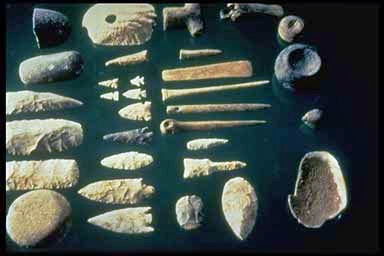 History is nowhere near being an exact science. Too many variables will spoil the party there. Historians write about what they know or what they have read, quoting facts and figures and sources to bolster the case. But as with exact science, the more the evidence, the surer the conclusion – or the more you have to rewrite your conclusion.
History is nowhere near being an exact science. Too many variables will spoil the party there. Historians write about what they know or what they have read, quoting facts and figures and sources to bolster the case. But as with exact science, the more the evidence, the surer the conclusion – or the more you have to rewrite your conclusion.That latter bit is the case with a new find out of Germany – that of a Stone Age flute.
 The common perception that most people have of Stone Age people is that they spent the vast majority of their time just surviving, or looking for food or caring for their family or making weapons to aid in conquest or doing other important things like that. When did Stone Age man or woman ever have time to do art? Isn't that an optional thing, that people do when they have time? Didn't these people have more important things to do, like chisel out knives and hammers and other implements of war?
The common perception that most people have of Stone Age people is that they spent the vast majority of their time just surviving, or looking for food or caring for their family or making weapons to aid in conquest or doing other important things like that. When did Stone Age man or woman ever have time to do art? Isn't that an optional thing, that people do when they have time? Didn't these people have more important things to do, like chisel out knives and hammers and other implements of war?Yet comes the announcement of the discovery of a bone flute that dates to the Stone Age, in the middle of an ice age. The flute was found, along with a couple of ivory flutes, at the Hohle Fels Cave, near Ulm. The flute is 8.5 inches long and has four holes in it. Archaeologists firmly believe that the flutes date to the initial settlement of the region. Surely those people, having just moved in to the area, had to focus entirely on things like food, shelter, and security. When did they find time to do music?
 Apparently, they found the time. This was long before the time when people who lived near Lascaux took time out to draw on cave walls. That was a mere 16,000 years ago. No, these flutes prove that people nearly 40,000 years ago not only had the time to play music but also had the patience to painstakingly construct a musical instrument. Playing such a flute didn't move anyone toward getting more food to eat or building a better fire or structure or weapon, but musical entertainment was obviously good for the soul and the well-being of these ancient people.
Apparently, they found the time. This was long before the time when people who lived near Lascaux took time out to draw on cave walls. That was a mere 16,000 years ago. No, these flutes prove that people nearly 40,000 years ago not only had the time to play music but also had the patience to painstakingly construct a musical instrument. Playing such a flute didn't move anyone toward getting more food to eat or building a better fire or structure or weapon, but musical entertainment was obviously good for the soul and the well-being of these ancient people.This discovery isn't necessarily proof that the people were settling down into long-term relationships with the land at this point in time, since such a portable musical instrument as a flute could be put into a pouch and carried from home to home. What this discovery does tell us, though, is how important music and its appreciation were to these people. Perceptions of ancient culture need revisiting, it would seem.
![Reblog this post [with Zemanta]](http://img.zemanta.com/reblog_e.png?x-id=fcb23606-2909-4f84-aee4-602bfee8a6f8)
No comments:
Post a Comment